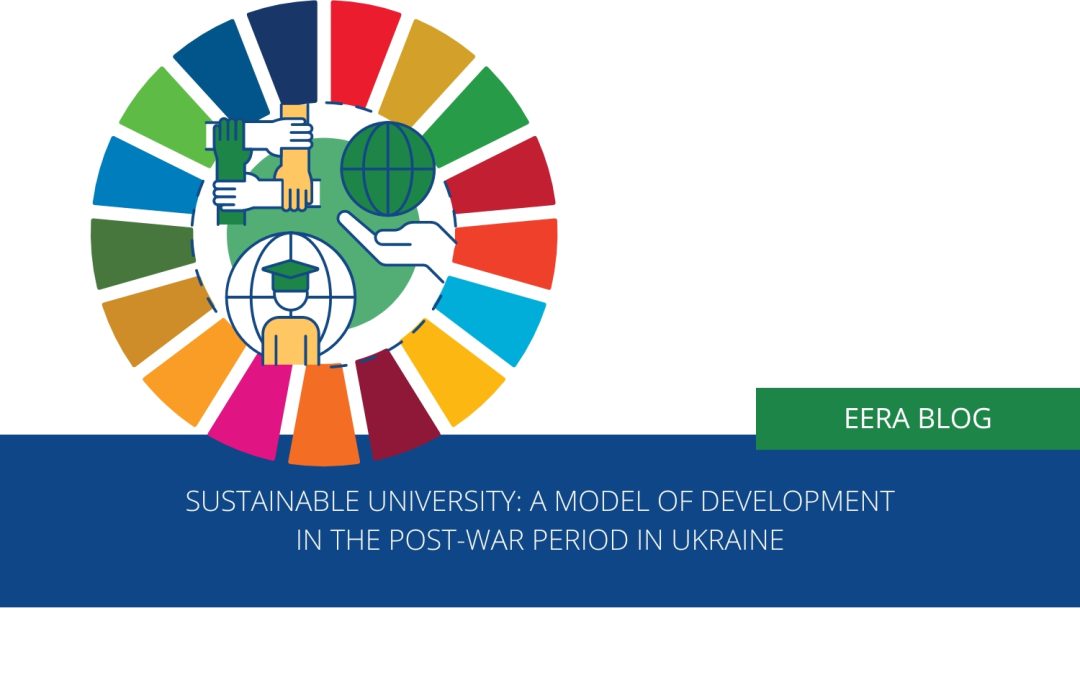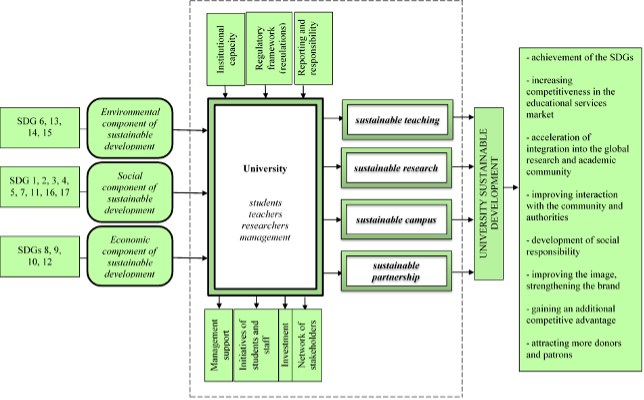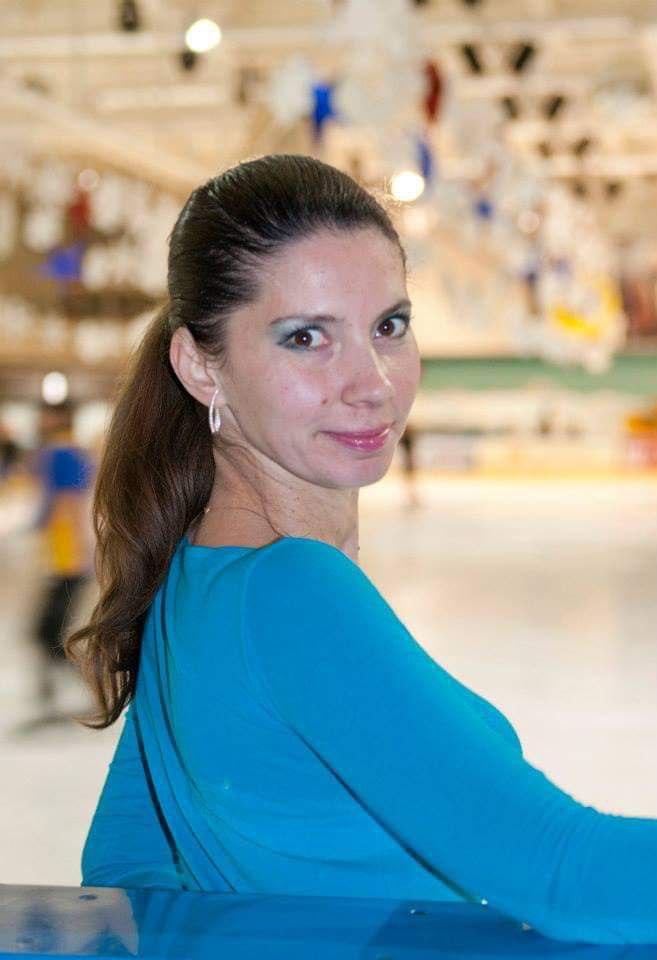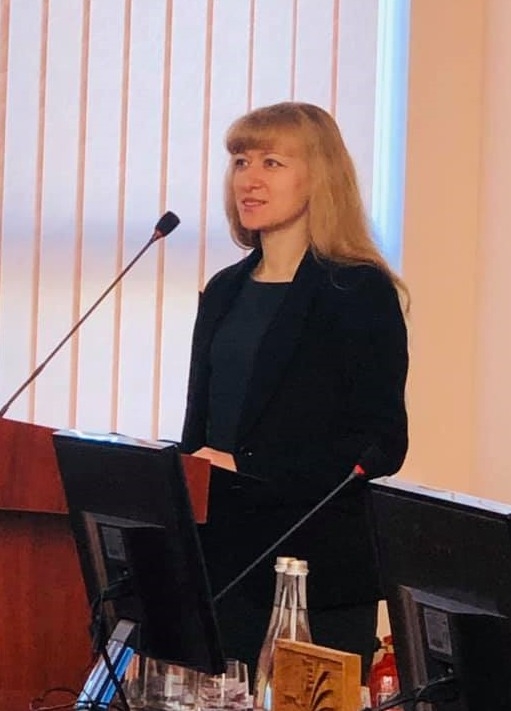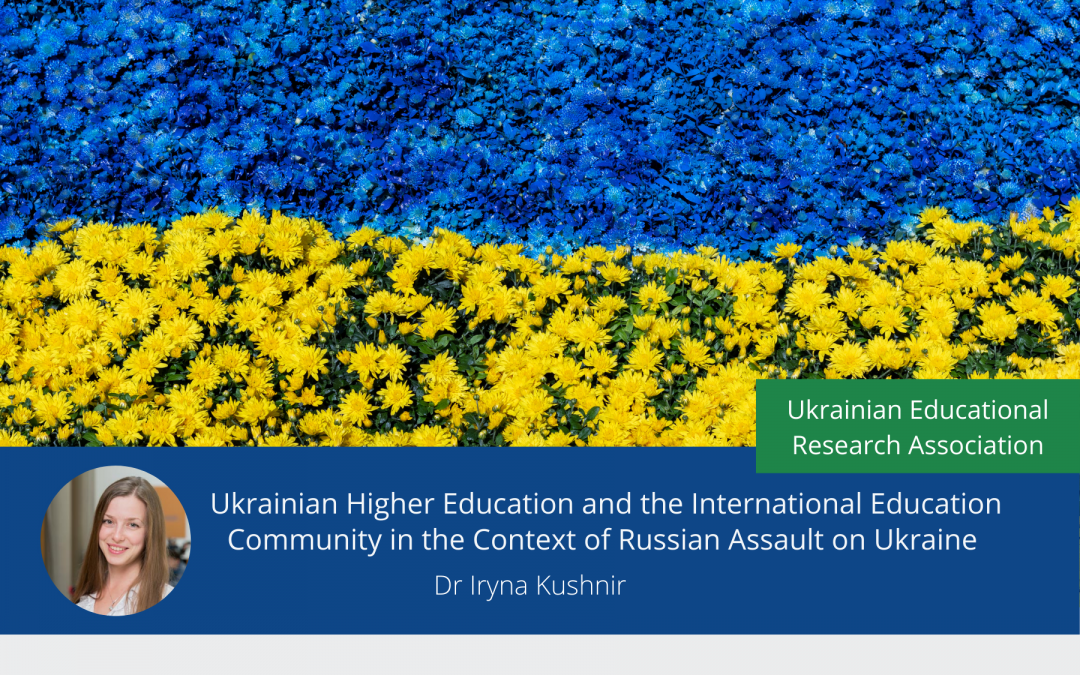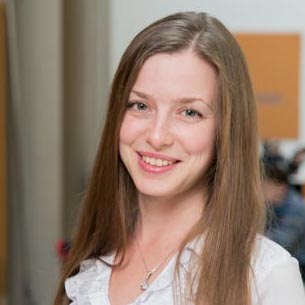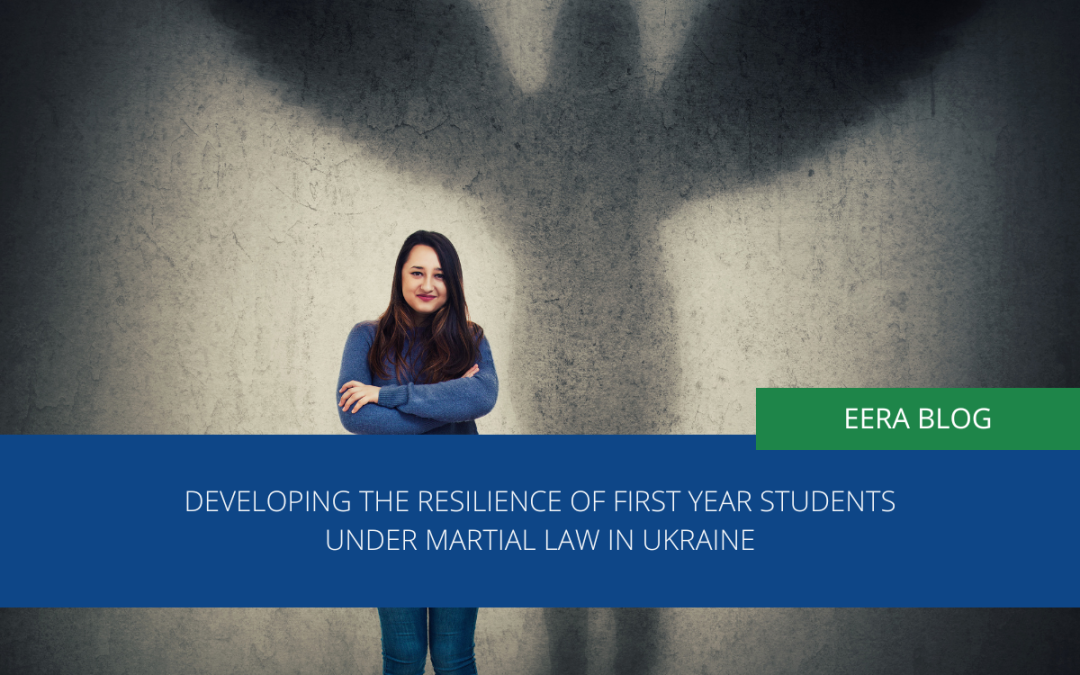
Developing the resilience of first-year students under martial law in Ukraine
War traumatises everyone it touches, especially children and young people. The World Health Organisation has noted that at least 10% of people who have experienced traumaticevents as a result of armed conflict have had serious mental health problems (and 10% of them will have behaviours that interfere with their ability to function effectively). The aggravation of the military conflict in Ukraine has made it important to implement the project “Development of Resilience of First-Level Higher Education Students in the Context of the Military Conflict in Ukraine”, which was made possible by the Ukrainian Educational Researchers Association with the support of the European Educational Research Association.
This study was conducted at the Faculty of Special and Inclusive Education of the Dragomanov Ukrainian State University (Kyiv) at the beginning of the academic year 2022-2023. Students had started studying from a distance, not only in different regions of Ukraine, but also in other countries as refugees.
Why focus on first-year students in Ukraine?
In the current realities of Ukraine, first-year students at Ukrainian universities are at risk of deteriorating mental health. Former school leavers had not yet fully adapted to the challenges and restrictions of receiving educational services in the COVID-19 pandemic [8; 15; 17], and the start of professional training again required a change in lifestyle, way of thinking, attitude towards themselves and others, in accordance with the requirements of the newly developing social situation [6; 9; 10; 11; 14]. And all this was happening against the backdrop of escalating military aggression by the Russian Federation, which was accompanied not only by a risk to life and health, but could also cause mental trauma or damage to basic structures of personality, starting with physiological reactions to stress, and ending with the general picture of the world and self-image [18].
After the first week of studying at the university under martial law, Ukrainian first-year students reported a deterioration in their mental health: symptoms of distress (asthenia, increased anxiety, lowmood, restless sleep, tension) and somatisation (headaches) prevailed. In some cases, this was combined with certain manifestations of anxiety (anxiety/panic attacks, fear of public embarrassment). More than half of the surveyed first-year students associated the deterioration of their mental health with their studies and the situation in Ukraine (52.1% and 66.2%, respectively) [2].
Why focus on resilience?
Adaptation to a difficult life situation, and overcoming and preventing negative consequences, is significantly influenced by the availability of certain personal resources. In this context, it is worth talking about resilience as a systemic element in the structure of a well-being personality, a positive mental state that leads to adequate adaptation in adverse circumstances. At the same time, resilience should be viewed as a resource that allows a person to choose the appropriate type of coping [13].
Resilience as a factor in maintaining mental health under martial law can be defined as an individual’s ability to return to normal functioning and to restore the previous state after a certain period of maladjustment due to stressful experiences[7]. It is also about the individual’s ability to prevent the emergence and exacerbation of psychological problems and dysfunctional disorders by “mitigating” the impact of the socio-psychological consequences of emergencies by actualising their own internal resources[3]. In other words, resilience should be viewed as a continuous, active process of emergence or development of new forces and resources for adaptation and recovery, which has uneven dynamics in the face of new risks [12].
According to the results of the Connor-Davidson Resilience Scale (CD-RISC-10), 38% ofUkrainian first-year students do not have the skills to maintain and support mental health, which is confirmed by their low levels of resilience [5]. Accordingly, these students have a reduced ability to influence a complex or atypical situation, lose their own resources, have difficulties in solving new challenges and issues of life, and have difficulties adapting.[16].
What contributes to preserving and restoring Ukrainian students mental health?
The structure of resilience includes three components:
- cognitive – represented by such components as openness to experience, tolerance to uncertainty and positive thinking
- emotional – involves emotional stability, emotional intelligence and extraversion
- behavioural – search activity, prosocial behaviour [3].
In other words, if a person does not lose the ability to think flexibly in an objectively or subjectively difficult life situation, he or she is more likely to be able to regulate his or her emotional state and prevent a physiological stress response. Given an adequate emotional response, they will seek a constructive solution to the problem, including by seeking social support.
The level of resilience of Ukrainian first-year students is closely related to the following components:
- extraversion – orientation towards other people, connections with them, support
- prosocial behaviour – orientation towards socially useful actions
- emotional stability – orientation towards emotional self-regulation
- openness to experience – orientation towards learning new experiences and skills
The level of resilience also depends on the complexity of the problems faced by the student [4].
How to develop first-year students’ mental health under martial law
The innate ability of a person to be more or less resistant to stress should not be underestimated. However, without either a spontaneous (by imitating the stress-resistant response of significant others and identifying with them) or specially–organised process of acquiring resilience skills, this may not be enough when the traumatic nature of the situation exceeds the individual’s inborn reserves to withstand its negative impact.
Therefore, a training programme on developing resilience in first-year students was developed to familiarise participants with a set of psychological tools that will help harmonise their self-image, self-concept and attitude to themselves; actualise and activate self-knowledge processes; and form emotional and behavioural self-regulation skills that will strengthen their psychological stability (resilience).
This training programme consists of six modules, each of which contributes to forming and developing important mental health competencies:
- The ability to communicate, develop relationships with other people, and to seek social support
- The ability to express their thoughts and feelings, focus their attention, and be empathetic to themselves
- The ability to identify and build on their value orientations, understand the meaning of their lives
- Positive thinking skills to strengthen self-confidence and increase their self-esteem
- The ability to build mutual support and effective cooperation and nurture life-giving relationships
- The building of skills for effective regulation of energy and emotions [1].
The programme was attended by 18 first-year students. 7 students took part in a one-day offline course, while the remaining 11 students were involved in two online psychological support groups and received training over a six-week period.
After participating in the scheme, 75% of the participants showed positive changes in their resilience, especially among the participants of the online psychological support groups. However, given the small number of students who had an objective opportunity to take the training in the harsh realities of Ukraine, it is worth talking about the need for further testing.
Activities to preserve and restore students’ mental health are ongoing. Elements of the training programme are used in the educational process in such disciplines as Psychological Counselling, Psychological Rehabilitation, Psychological Correction, etc. The training programme is also being actively implemented in the work of the Centre for Psychological Support and Social Adaptation at the Faculty of Special and Inclusive Education of Dragomanov Ukrainian State University.
Key Messages
- At least 10% of people who experience traumatic events, such as the war in Ukraine have serious mental health problems
- A project by the Ukrainian Educational Researchers Association and EERA was launched to support Ukrainian first-year students
- The project focused on first-year students, as they were coping with the after-effects of the COVID-19 pandemic, and the transition from school to professional training
- Ukrainian students reported a deterioration in their mental health after the first week of studying at the university
- The EERA and UERA programme focused on building the resilience of Ukrainian students, to help them cope with the stress of studying during martial law
- 75% of participants showed positive changes in their resilience after taking part in the programme
- Futher activities to preserve and restore students’ mental health in Ukraine are ongoing
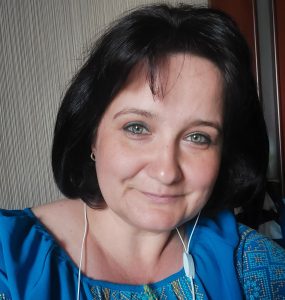
Dr Hanna Afuzova
Associate Professor of the Department of Special Psychology and Medicine, Faculty of Special and Inclusive Education, Drahomanov University, Ukraine
Hanna Afuzova holds a PhD in Psychology and is an Associate Professor of the Department of Special Psychology and Medicine, Faculty of Special and Inclusive Education, Ukrainian State Drahomanov University (Kyiv, Ukraine)
https://orcid.org/0000-0001-8112-8943
Researcher ID: HZI-0197-2023
Other blog posts on similar topics:
- Afuzova, H. (Eds.). (2023). Rozvytok rezylientnosti zdobuvachiv pershoho rivnia vyshchoi osvity v umovakh voiennoho konfliktu na terytorii Ukrainy [Development of resilience of first-level higher education students in the context of military conflict in Ukraine]. Retrieved from URL Методичні рекомендації з розвитку резильєнтності – Google Диск [in Ukrainian].
- Afuzova, H. V., Naydonova, G. O., & Krotenko, V. I. (2022). Osoblyvosti psykhichnoho zdorovia pershokursnykiv na etapi adaptatsii do profesiinoho navchannia v umovakh voiennoho stanu [Features of The Mental Health of First-Year Students at the Stage of Adaptation to Professional Education Under Martial Law]. Habitus, 41, 278–273. https://doi.org/10.32782/2663-5208.2022.41.49 [in Ukrainian].
- Afuzova, H. , Naydonova, G. O., & Krotenko, V. I. (2023). Rezylientnist yak chynnyk zberezhennia psykhichnoho zdorovia v umovakh voiennoho stanu [Resilience as a factor in maintaining mental health under martial law]. Habitus, 53, 100–104. http://habitus.od.ua/journals/2023/53-2023/16.pdf [in Ukrainian].
- Afuzova, H., Krotenko, V., & Naydonova, G. (2023). Rozvytok rezylientnosti pershokursnykiv na etapi adaptatsii do profeisinoho navchannia v umovakh voiennoho stanu [Development of first-year students’ resilience at the stage of adaptation to professional training under martial law], Psykhichne zdorovia v umovakh viiny: shliakhy zberezhennia ta vidnovlennia: zbirnyk materialiv I Vseukrainskoi naukovo-praktychnoi konferentsii (z mizhnarodnoiu uchastiu) [Mental health in the conditions of war: ways of preservation and restoration: collection of materials of the First All-Ukrainian Scientific and Practical Conference (with international participation)]. Kyiv, 5–8. [in Ukrainian].
- Afuzova, H., Naydonova, G., & Krotenko, V. (2023). A study of Ukrainian first-year students’ resilience at the stage of adaptation to training and professional activities under martial law. Studies in Comparative Education, (1), 4–13. https://doi.org/10.31499/2306-5532.1.2023.288413
- Androsovych, K. A. (2015). Psykholohichni chynnyky sotsialnoi adaptatsii pershokursnykiv v umovakh osvitnoho seredovyshcha profesiino-tekhnichnoho navchalnoho zakladu [Psychological Factors of Social Adaptation of Freshmen in the Educational Environment of a Vocational School]. (Candidate`s thesis). Volodymyr Dahl East Ukrainian National University. Severodonetsk. [in Ukrainian].
- Assonov, D., & Khaustova, O. (2019). Rozvytok kontseptsii rezyliiensu v naukovii literaturi protiahom ostannikh rokiv [Development of the concept of resistance in the scientific literature in recent years]. Psykhosomatychna medytsyna ta zahalna praktyka, 4(4), e0404219. https://doi.org/10.26766/pmgp.v4i3-4.219 https://uk.e-medjournal.com/index.php/psp/article/view/219 [in Ukrainian].
- Education and COVID-19: challenges and opportunities (2020). Retrieved from URLhttps://en.ccunesco.ca/idealab/education-and-covid-19-challenges-and-opportunities
- Enes, R., & Tahsin, I. (2016). Coping styles, social support, relational self-construal, and resilience in predicting students’ adjustment to university life, educational sciences. Theory and Practice, 16(1), 187– https://doi.org/10.12738/estp.2016.1.0058
- Fryer, L. K. (2017). (Latent) transitions to learning at university: A latent profile transition analysis of first-year Japanese students. Higher Education, 73(3), 519– https://doi.org/10.1007/s10734-016-0094-9
- Gonta, I., & Bulgac, A. (2019). The Adaptation of Students to the Academic Environment in University. Revista Romaneasca Pentru Educatie Multidimensionala, 11(3), 34-44. https://doi.org/10.18662/rrem/137
- Grygorenko, Z., & Naydonova, G. (2023). The concept of “resilience”: history of formation and approaches to definition. Public administration and law review, (2), 76–88. https://doi.org/10.36690/2674-5216-2023-2-76-88
- Kireieva, Z. O., Odnostalko, O. S., & Biron, B. V. (2020). Psykhometrychnyi analiz adaptovanoi versii shkaly rezylientnosti (CD-RISC-10) [Psychometric Analysis of the Adapted Version of the Resilience Scale (CD-RISC-10)]. Habitus, 14, 110-116. https://doi.org/10.32843/2663- 5208.2020.14.17 [in Ukrainian].
- Nelson, K. J., Smith, J. E., & Clarke, J. A. (2012). Enhancing the transition of commencing students into university: an institution-wide approach. Higher Education Research & Development, 31(2), 185-199. https://doi.org/10.1080/07294360.2011.556108
- Nestorenko, Т., & Pokusa, Т. (Eds.). (2020). Education during a pandemic crisis: problems and prospects. Opole: The Academy of Management and Administration in Opole.
- Odnostalko, O. S. (2020). Resursy stiikosti osobystosti v umovakh skladnykh ta netypovykh sytuatsii zhyttia [Resources of Personality Stability in the Conditions of Difficult and Atypical Situations of Life]. (Candidate`s thesis). Lesya Ukrainka Volyn National University. Lutsk. [in Ukrainian].
- Özüdoğru, G. (2021). Problems faced in distance education during Covid-19 Pandemic. Participatory Educational Research, 8(4), 321-333. https://doi.org/10.17275/per.21.92.8.4
- Ulko, N. M. (2016). Psykhoeduktsiia yak chynnyk sotsialno-psykholohichnoi reabilitatsii [Psychoeduction as a Factor of Socio-Psychological Rehabilitation], Sotsialno-profesiina mobilnist v umovakh suchasnoi osvity: materialy Mizhnarodnoi naukovo-praktychnoi konferentsii [Social and Professional Mobility in The Conditions of Modern Education: International Conference Proceedings]. Kyiv, р. 16. [in Ukrainian].
- World Health Organization. World health report 2001 – Mental health: new understanding, new hope. Geneva: Switzerland; 2001. [Google Scholar]

